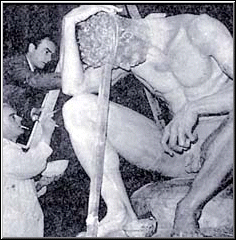The National Socialist Program, also referred to as the 25-point program or 25-point plan was developed to formulate the party policies of, first, the Austrian German Workers Party (or DAP) and was copied later by Adolf Hitler's Nazi party. It is an amalgamation of demands that would be typically associated with various different (and antagonistic) political trends. It was first developed in Vienna, at a German Workers Party congress, and was brought to Munich by Rudolf Jung, who was expelled from Czechoslovakia. The National Socialist program also contained a number of points that supported democracy and even called for wider democratic rights. These, like much of the program, lost their importance as the Party evolved, and were ignored by the Nazis after they rose to power.
Background: At the time this program was written, Czechoslovakia and Austria did not exist as separate countries. They both existed under the Austro-Hungarian Empire. The programs of the Sudetenland and Austrian National Socialists developed under the Habsburg monarchy and in one single country at the time. Different German Worker parties developed in Vienna, Aussig, and Eger. Hitler and the other leaders that would later play a major role in Nazi Germany were not involved in the creation of the original National Socialist programs, a fact which explains the differences between these programs and the actions of the German Nazi Party.
 Austrian Party Platform
Austrian Party PlatformThe 25 point Program of the Nationalsozialistische Deutsche Arbeiterpartei (NSDAP) was proclaimed by Adolf Hitler at a large party gathering in Munich on February 25, 1920 when the group was still known as the German Workers Party. The party kept the program when it changed its name to the National Socialist German Workers Party in April 1920 and it remained the official party program throughout the party's existence - though many of the demands listed in it were not carried out after the NSDAP eventually came to power. The program was adapted from Rudolf Jung's Austro-Bohemian program by Anton Drexler, Adolf Hitler, Gottfried Feder and Dietrich Eckart. Unlike the Austrian program, the NSDAP program makes no claims of being "liberal" or democratic, nor does it express an opposition to "reaction" or to aristocracy. However, it endorses democratic institutions such as the central parliament of Germany, and makes no mention of wishing to abolish democracy - on the contrary, by demanding that only Germans be allowed to vote, it implicitly assumes that voting would still take place under a NSDAP government. This is one of the several areas where real Nazi practice diverged from Nazi demands.
Erik von Kuehnelt-Leddihn argues that ten of the twenty-five points are pro-labor, claiming that "the program championed the right to employment and called for the institution of profit sharing, confiscation of war profits, prosecution of userers and profiteers, nationalization of trusts, communalization of department stores, extension of the old-age pension system, creation of a national education program of all classes, prohibition of child labor, and an end to the dominance of investment capital."
 The full text of the 25 point program
The full text of the 25 point program
No comments:
Post a Comment